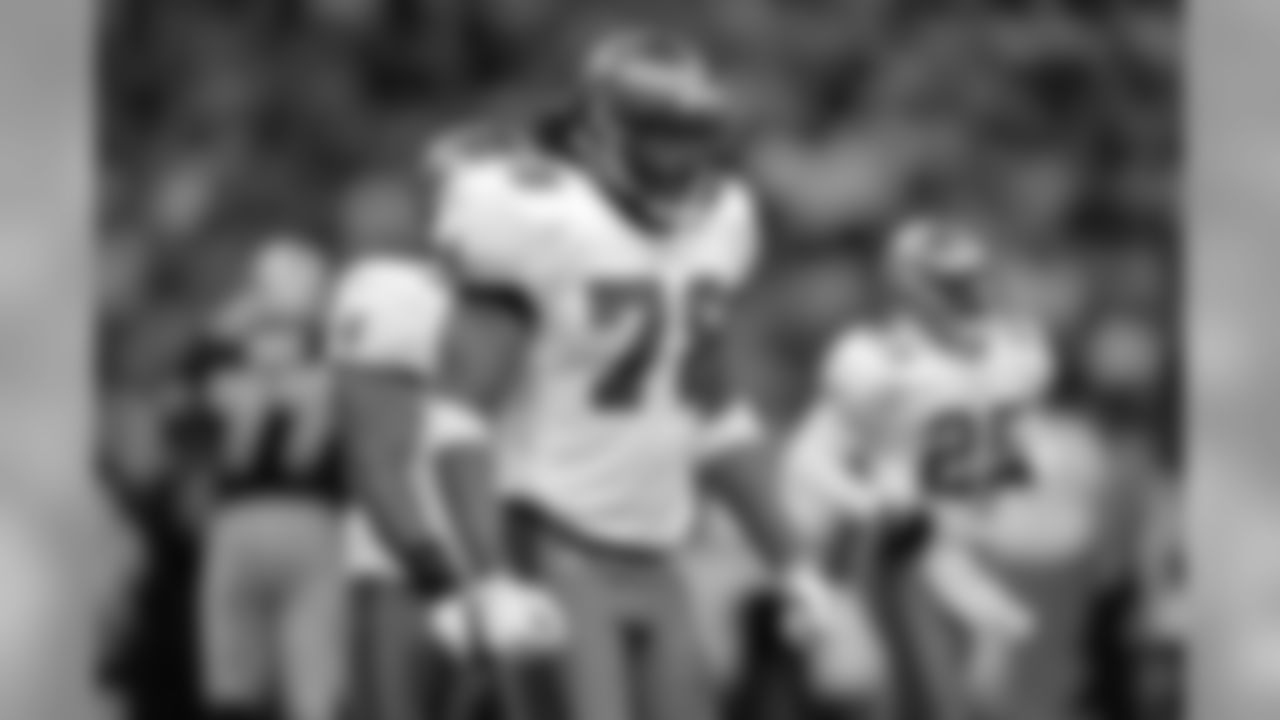*
See every first-round Draft pick ever selected by the Tampa Bay Buccaneers.

2017 - O.J. Howard, TE

2016 - Vernon Hargreaves, CB

2015 - Jameis Winston, QB

2014 - Mike Evans, WR

2012 - Doug Martin, RB

2012 - Mark Barron, SS

2011 - Adrain Clayborn, DE

2010 - Gerald McCoy, DE

2009 - Josh Freeman, QB

2008 - Aqib Talib, CB

2007 - Gaines Adams, DE

2006 - Davin Joseph, G

2005 - Carnell Williams, RB

2004 - Michael Clayton, WR

2001 - Kenyatta Walker, T

1999 - Anthony McFarland, DT

1997 - Reidel Anthony, WR

1997 - Warrick Dunn, RB

1996 - Marcus Jones, DT

1996 - Regan Upshaw, DE

1995 - Derrick Brooks, LB

1995 - Warren Sapp, DT

1994 - Trent Dilfer, QB

1993 - Eric Curry, DE

1991 - Charles McRae, T

1990 - Keith McCants, LB

1989 - Broderick Thomas, LB

1988 - Paul Gruber, T

1987 - Vinny Testaverde, QB

1986- Rod Jones, DB

1985 - Ron Holmes, DE

1982- Sean Farrell, G

1981 - Hugh Green, LB

1980 - Ray Snell, G

1978 - Doug Williams, QB

1977 - Ricky Bell, RB

1976 - Lee Roy Selmon, DE
Each week during the remainder of the offseason, Senior Writer/Editor Scott Smith will dip into the inbox to answer questions from Buccaneer fans. This week, we discuss the value of kick returners given recent rule changes. We also answer this question: If the current offense is on the cusp of being the most productive one in the Bucs' four-decade history, which past season do they have to beat for the title?
Fans can submit questions for upcoming mailbags via Twitter to @ScottSBucs (#BucsMailbag), through a message on the Buccaneers Official Facebook Page or via email at *tbbsocial@buccaneers.nfl.com*. The One Buc Mailbag runs every Thursday and is not necessarily meant to reflect the opinions of the team's management or coaching staff.
*1. Minimizing Return Men?
@ScottSBucs is there really any point in investing in a kick returner with the new touchback rules
— Alex Harris (@alexharrisbucs) March 31, 2016
I see where you're coming from, Alex. Indeed, rule changes and the evolution of NFL strategy are making the kick returner less important or less prevalent, much as they have already done for the fullback and the jumbo, Levon Kirkland-style linebacker. The rule change to which you refer was just approved at the NFL's Annual Meeting in Boca Raton a couple weeks ago, and it states that offenses will now start at their own 25-yard line after a kickoff touchback, rather than the 20. Hypothetically, that should lead to fewer kickoff returns, as the man fielding the ball in the end zone has more incentive to simply kneel. (Though there is a school of thought that this rule will have the opposite of its intended effect.)
Some teams don't even bother to keep a traditional fullback on the roster anymore, and some teams want one but have trouble finding one. Dirk Koetter's Bucs don't currently have a fullback on the roster, though the new head coach said they are looking for one and don't intend to excise the position from their plans. You can't really do that with the kick-return position because there will always be some returns – and there are still plenty on punts – but you could make finding and spending on one less of a priority, I suppose.
That said, I would still say yes to your specific question, Alex. There is a point to investing in a kick returner, and I think the key word here is "invest." See, it doesn't usually take much of an investment, in terms of cash and cap space, to fill that position. In fact, it's often no investment at all because the job is filled by a player you brought onto the roster for another reason. The Vikings didn't spend the 29th overall pick in the 2013 draft to get the league's best kickoff returner, but that's what they have now in Cordarrelle Patterson. In their case, that's helping them get value out of a player who hasn't developed as a receiver to the extent they truly wanted.
The rest of the top five in kickoff return average last season were: Detroit RB Ameer Abdullah (a second-round pick in 2015), New York Giants WR Dwayne Harris (a sixth-round pick by Dallas in 2011), St. Louis RB Benny Cunningham (an undrafted free agent in 2013) and Arizona RB David Johnson (a third-round pick in 2015). Only one of those four really made it in the NFL because of his return abilities (and other special teams contributions) – Harris, who did finally get a bit of a chance to prove himself as a receiver last year with the Giants.
The Giants did pay Harris pretty well after his three seasons in Dallas, though that contract was initially met with some surprise last March. Harris made the deal more palatable with his late-season emergence as a viable receiver, but it should be noted that as his role grew on offense his participation on special teams diminished some.
The Buccaneers tried to find a specific return man in the draft last year, using a sixth-round pick on Utah's Kaelin Clay. When that didn't work out, the job went to RB Bobby Rainey, a former undrafted free agent who came to the Bucs as a waiver claim a couple years earlier. At those aforementioned meetings in Boca Raton, Koetter mentioned that WR Kenny Bell, a fifth-round pick in the 2015 draft who missed all of last season on injured reserve, could get a shot at the job in 2016.
I would agree that if you were a talented return man who was in the NFL mostly for that reason – say Brian Mitchell, Dante Hall or Devin Hester in their respective primes – and you hit free agency this year, that rule change would probably hurt your value. It would almost certainly reduce the number of teams that were interested in signing you. There really aren't that many players who fit in that category, however.
There is another type of investment a team is making if they carry a player on the roster specifically to return kicks. Call it an opportunity cost. If Clay had made the Bucs' roster out of training camp, solely for the purpose of returning kicks, that would cost the team a roster spot that would have gone to another player who could help in a different way. Bobby Rainey, for instance, and Rainey made a nice insurance policy last year against injury to Doug Martin or Charles Sims. If, instead, you find a good kick returner who is already on your roster and already producing in some other way – such as David Johnson with the Cardinals – then you haven't cost your team anything in terms of the 53 available roster spots or the 46 game-day active spots.
One other thing: kick returners may have less impact on the game than they did a few years ago, but when one of them does manage to score on a runback it's a pretty impactful turn of events. Over the last 10 seasons there have been 125 instances of a player returning at least one kickoff for a touchdown in a game; the scoring player's team has won 73 of those 125 games, for a winning percentage of .584. It's these game-changing plays that keep coaches and personnel men in search of return weapons even as the league's rules serve to minimize their impact.
2. Offensive Peak?
Scott, I've heard you say on the podcast a couple times that the offense the Bucs are building now has a chance to be "the best in team history," or something to that effect. I don't have the exact wording, but that was the idea. I like the sound of that. I think it's a little early to be sure, but I hope you're right. Anyway, my question is, what would this offense be chasing? I mean, what would you say was the best offense in team history to this point?Thx – Vic, via email to**tbbsocial@buccaneers.nfl.com**
Good question, Vic. And when you say podcast I assume you're referring to one or more of our Insider Live shows, which is indeed available in that form. I had somebody ask me how to find them once, so if there's anybody else out there with the same question I'll share the answer here. All you have to do is click on the iTunes icon on the top right of the header on Buccaneers.com. There's a row of seven icons just under the Search field – Pinterest and Facebook and the like. The iTunes icon is the purple one that looks like an antenna broadcast. Click on that and you'll get a whole list of available podcasts, also including things like press conferences and (during the season) players' radio shows.
See how Sports Illustrated Senior Writer Don Banks predicts Round 1 of the 2016 NFL Draft.

- DEN - Connor Cook, QB

- CAR - Germain Ifedi, OT

- AZ - Robert Nkemdiche, DT

- KC - William Jackson, CB

- GB - A'Shawn Robinson, DT

- SEA - Cody Whitehair, OL

- PIT - Eli Apple, CB

- CIN - Corey Coleman, WR

- MIN - Will Fuller, WR

- HOU - Josh Doctson, WR

- WAS - Reggie Ragland

- NYJ - Leonard Floyd, OLB

- BUF - Noah Spence, DE

- IND - Taylor Decker, OT

- ATL - Sheldon Rankins, DT

- DET- Laquon Treadwell, WR

- LA - Paxton Lynch, QB

- OAK - Mackensie Alexander, CB

- MIA - Shaq Lawson, DE

- NO - Darron Lee, LB

- CHI - Jack Conklin, OT

- NYG - Ronnie Stanley, OT

- TB - Vernon Hargreaves, CB

- PHI - Ezekiel Elliott, RB

- SF - Carson Wentz, QB

- BAL - Joey Bosa, DE

- JAX - Myles Jack, LB

- DAL - DeForest Buckner, DE

- SD - Jalen Ramsey, S

- CLE - Jared Goff, QB

- TEN - Laremy Tunsil, OT
Okay, back to the question, which like I said is a good one. I have indeed made that statement a couple times on the show, and I actually believe it's going to happen. That's due in part to the undeniable fact that the Buccaneers as a franchise have a much richer history on defense than offense. The Bucs have rarely been among the league's elite on offense during their first 40 years, and certainly not for any long stretch of seasons, like the defense was in the late '70s/early '80s and the mid-'90s through the Super Bowl era.
My point is that we could be on the cusp of that first long run for the Bucs' offense because there is so much young talent at the core of this current team. It starts, of course, with Jameis Winston, who could quickly become the most productive quarterback the team has ever had and is only 22 years old. Mike Evans. Ali Marpet. Austin Seferian-Jenkins. Donovan Smith. Even some slightly-older-but-still-very-much-in-their-prime guys like Doug Martin, J.R. Sweezy and Demar Dotson. And like Dirk Koetter, I think Vincent Jackson still has a lot left in the tank. Oh yeah, Dirk Koetter. Let's not forget about him. His play-calling helped to revitalize that unit in 2015 and he's still going to be filling that role in 2016, even as head coach.
By a couple measures, the current offense is already the best the team has ever had. The 2015 squad set a new franchise single-season record with 6,014 yards and ranked fifth in the league in that category, its highest finish ever. Tampa Bay's offense has achieved a top-10 ranking in the NFL's charts just twice before, finishing ninth in 2012 and 10th in 2003.
That said, I'm not claiming that the 2015 offense was the best in team history, and I haven't heard anybody else make that claim either. The main issue, of course, is that the Bucs finished 20th in the NFL in scoring, which is obviously more important than yards. Tampa Bay put up 342 points last fall, or 21.4 per game, which is just the fifth best single-season mark in team history. Now, fifth isn't bad, not bad at all with a rookie at the helm, but it's still pretty far behind the 389 points the 2012 team scored to set the franchise record.
That bar isn't too high, really. The Bucs have never scored 400 points in a season; nine teams did that last year. Eighty-one teams have done it in the last 10 years, or almost exactly eight per season. It seems like a very attainable goal for this young and rising offense.
But your question, asked so very many scroll-ups above, is which Bucs team do they need to surpass in order to be considered the best offense in franchise history? Let's look at the candidates, in reverse chronological order.
2012: Obviously we have to include this season since it is the highest-scoring team the Bucs have had,
Pictures from top prospects' Pro Day workouts.

DE DeForest Buckner, Oregon

DE DeForest Buckner, Oregon

OT Laremy Tunsil, Ole Miss

OT Laremy Tunsil, Ole Miss

QB Carson Wentz, North Dakota State

QB Carson Wentz, North Dakota State

CB Jalen Ramsey, Florida State

CB Jalen Ramsey, Florida State

DE Joey Bosa, Ohio State

DE Joey Bosa, Ohio State

LB Myles Jack, UCLA

LB Myles Jack, UCLA

RB Ezekiel Elliott, Ohio State

RB Ezekiel Elliott, Ohio State

DE Kevin Dodd, Clemson

DE Kevin Dodd, Clemson

OT Ronnie Stanley, Notre Dame

OT Ronnie Stanley, Notre Dame

DE Leonard Floyd, Georgia

DE Leonard Floyd, Georgia

WR Laquon Treadwell

WR Laquon Treadwell

CB Eli Apple, Ohio State

CB Eli Apple, Ohio State

QB Jared Goff, California

QB Jared Goff, California

DE Shaq Lawson, Clemson

DE Shaq Lawson, Clemson

LB Reggie Ragland, Alabama

LB Reggie Ragland, Alabama
and it also held the yardage record until last year (363.8 per game). It also had a young and promising quarterback (Josh Freeman) and a running back named Doug Martin at its core. Of course, that didn't really work out the way it looked like it might when Freeman was lighting it up in the middle of that season. That was a very streaky offense, though. In one six-game midseason stretch the Bucs averaged 431.5 yards and 34.2 points per outing. The rest of the season, they averaged 323.1 yards and 18.4 points per game. The Bucs couldn't maintain that hot streak down the stretch and then fell off very badly the next year. Martin did make the Pro Bowl that year, as did Vincent Jackson, who proved to be a brilliant free agency addition.
2010: This was Freeman's first full year as a starter and the one in which he posted the ridiculous (and unsustainable) 26-5 TD-INT ratio. That offense turned the ball over fewer than any other team in franchise history, which is pretty significant. It also had the best TD-INT ratio (obviously), the second-best third-down success rate and the fourth-best yards-per-game average. Probably it's best argument for the top spot besides that great ball security is its average gain-per-play of 5.61 yards. That's the best in team history, though it only ranked 11th in the NFL that year (and would have ranked 10th last season). This was also Mike Williams' outstanding rookie year (11 touchdowns) and it featured the stunning emergence of LeGarrette Blount and his defender-hurdling tendencies.
2008, 2007: The last year in the Gruden era, 2008 probably won't top the list but it's worth mentioning because that team finished with 341.0 yards per game, third-best behind '15 and '12. It also ranks third among Buc teams in points per game (22.6) and fifth in both first downs and net passing yards per game. Jeff Garcia was the quarterback and was actually quite efficient (90.2 passer rating, 64.9% completion rate). He just couldn't stay healthy for an entire season. WR Antonio Bryant proved to be a stunning reclamation project, though that find really only lasted for one big season. Warrick Dunn came back to end his career in Tampa and was still reasonably effective (4.2 yards per carry) but the Bucs didn't mount a very strong running game with him, Earnest Graham and Cadillac Williams. You could say a lot of the same things about 2007, the Bucs' last playoff season, only without Dunn and with Joey Galloway catching all the passes instead of Bryant.
2003: This was a surprisingly unbalanced unit in a season that nothing at all like it was expected to go. A dominant opening-week win in Philadelphia seemed to indicate that the defending champs were going to make another run at the title, but a plague of injuries and unusual occurrences (like blocked extra points at the end of regulation and epic Monday night comebacks) led to a 7-9 finish. On offense, the running game completely disappeared, leaving Brad Johnson to carry the complete load. Johnson responded with 3,881 yards and 26 touchdowns, leading the best passing attack in team history to that point (later surpassed in '12 and '15). But he also threw 21 interceptions. Keenan McCardell delivered a Pro Bowl season but Keyshawn Johnson's relationship with the team deteriorated so badly that he was basically sent home for the last six games, so that was a wash. Overall, this was still the fourth-best offense in team history in terms of yards per game, but it doesn't crack the top five in points per game.2002: The Super Bowl victory is this offense's best argument. There were times during the season that the league's best defense carried the team, and Brad Johnson missed several games in December with a back injury, but the offense should get credit for picking it up significantly in the postseason. The offensive line, oft-criticized during the season, was particularly masterful in the playoffs, allowing just one sack in three games. Johnson had a great year, throwing 22 touchdown passes against just six interceptions and compiling a 92.9 passer rating. This offense did have balance, thanks to strong contributions from such offseason additions as McCardell, Joe Jurevicius, Michael Pittman, Ken Dilger and Rickey Dudley. The 2002 team scored 21.6 points per game, fourth-best in team history, and turned it over just 21 times, also fourth-best.
2000: Few Buc fans probably think of 2000 as a particularly strong offensive season, and it wasn't enough for QB Shaun King to keep his job after his first full year as the starter. The Bucs went out and got Johnson in free agency in 2001. However, the 2000 team ran the football very, very well behind a line that included two Pro Bowl imports from the Vikings, center Jeff Christy and guard Randall McDaniel. The "Thunder & Lightning" duo of Mike Alstott and Warrick Dunn led the rushing attack to 129.1 yards per game, fifth-best in team history. Four players from that offense went to the Pro Bowl, which is tied for the most the team has ever sent in a single season. This was also the second-highest scoring team in franchise annals, averaging 24.3 points per game. Ah, but there's a catch: That total was helped dramatically by seven – SEVEN! – touchdowns on defense and special teams.
1997: This was the first Buccaneer offense ever to send more than one player to the Pro Bowl, as Alstott, Dunn, QB Trent Dilfer and center Tony Mayberry all made the trip to Hawaii. That gets it a spot on the list, and the new Alstott-Dunn combo was legitimately exciting to watch. The passing attack, despite Dilfer's all-star nod, was relatively anemic, however, with no player recording as many as 40 catches, 500 yards or five touchdowns. This was just the 17th-highest scoring team in franchise history.
1984: Big jump in years, huh? Like I said, there haven't been many periods of above-average offense in team history. Mark Carrier was at the center of a decent attack in 1989, but that team didn't run very well and QB Vinny Testaverde threw 22 interceptions against 20 touchdowns. The 1984 team, in contrast, had one enormous strength: The rushing attack, and particularly James Wilder. That offense ranks sixth in team history in yards per game (332.6) and first in both first downs (344) and third-down percentage (42.9). That was mostly due to Wilder, who set a then-NFL record with 407 carries and gained 1,544 yards on the ground, still the top mark in team annals. Steve DeBerg threw for 3,554 yards but he leaned on Wilder, too, getting him the ball another 85 times through the air. This is the seventh-highest scoring offense in team history (20.9) and the first to crack 20 points per game.
1979: We'll give Doug Williams and the first playoff offense in team history some love, particularly because it is still the best rushing team in franchise history. With Ricky Bell and Jerry Eckwood sharing the load, the Bucs' rushing attack averaged 152.3 yards per game, significantly better than last year's squad, which is second on the list at 135.1. Williams' raw numbers don't impress – 41.8% completion rate and 18-24 TD-INT ratio, but he was highly valued at the time for his selflessness and leadership. We must also note the differences in the game between 1979 and the current era, however. That rushing attack may have been by far the best in team history, but it was only eighth in the NFL that year.
That's my list: 2015, 2012, 2010, 2008, 2007, 2003, 2002, 2000, 1997, 1984 and 1979. How do I choose from among that group of offenses, especially when it can be difficult to compare teams from different eras? Well, I think the key lies in my final point in the paragraph about the 1979 offense. I've told you how Buccaneer offenses compare to each other, and that is an important part of what we're doing here, but we should also consider how each one compares to the other teams in the league that season.
I think we can agree that points are more important than yards, so let's start there. Only four Buccaneer offenses have performed better than the league average in terms of points per game, and the 2000 team is the leader by a wide margin.
|
Season |
Bucs |
NFL |
Diff. |
Pct. |
|
2000 |
24.3 |
20.7 |
3.7 |
17.68% |
|
2012 |
24.3 |
22.8 |
1.6 |
6.81% |
|
2008 |
22.6 |
22.1 |
0.6 |
2.49% |
|
2001 |
20.3 |
20.2 |
0.1 |
0.50% |
But, remember: That 2000 team was helped by seven non-offensive touchdowns, which is really a remarkable number and it skews the results quite a bit. After that team, the 2012 squad has a pretty strong hold on the second spot.
As for yards, the Bucs have finished above the league average eight times, including last year.
|
Season |
Bucs |
NFL |
Diff |
Pct. |
|
2003 |
340.8 |
318.3 |
22.5 |
7.07% |
|
2015 |
375.9 |
352.9 |
23.0 |
6.52% |
|
2012 |
363.8 |
347.2 |
16.6 |
4.78% |
|
2008 |
341.0 |
327.3 |
13.8 |
4.20% |
|
1982 |
321.7 |
317.2 |
4.5 |
1.42% |
|
1984 |
332.6 |
329.8 |
2.8 |
0.85% |
|
2007 |
326.8 |
325.2 |
1.6 |
0.49% |
|
1992 |
298.2 |
298.2 |
0.1 |
0.02% |
You can't add to your yardage total on defense or special teams, so there's no caveat to the list above. It's encouraging to see where 2015 places on that list, and it adds to the disappointment that was the 2003 season to see that the offense that year was significantly above average. But only two teams are on both of these lists: 2012 and 2008. Since 2012 ranks higher than 2008 on both lists, and since it is second on the points-vs.-league-average list, I'm going with 2012 for the final answer to Vic's question.
That 2012 team got good to very-good performances from its quarterback (Freeman), running back (Martin) and top receiver (Jackson). Martin and Jackson are still big parts of the projected 2016 offense, and they've since been joined by Evans, Seferian-Jenkins, Sims and several young and promising linemen. Obviously, that mid-2012 run proved to be Freeman's final peak, but it's safe to say the Buccaneers think they are now significantly better positioned for the future at that most important of positions with Winston. You can see why I believe the is offense is on the cusp of becoming the best one in franchise history.

































